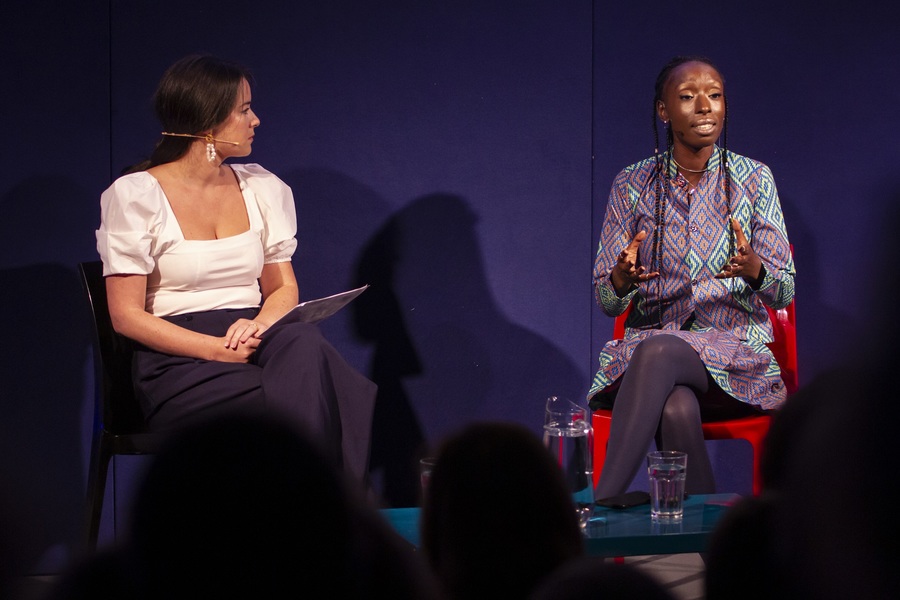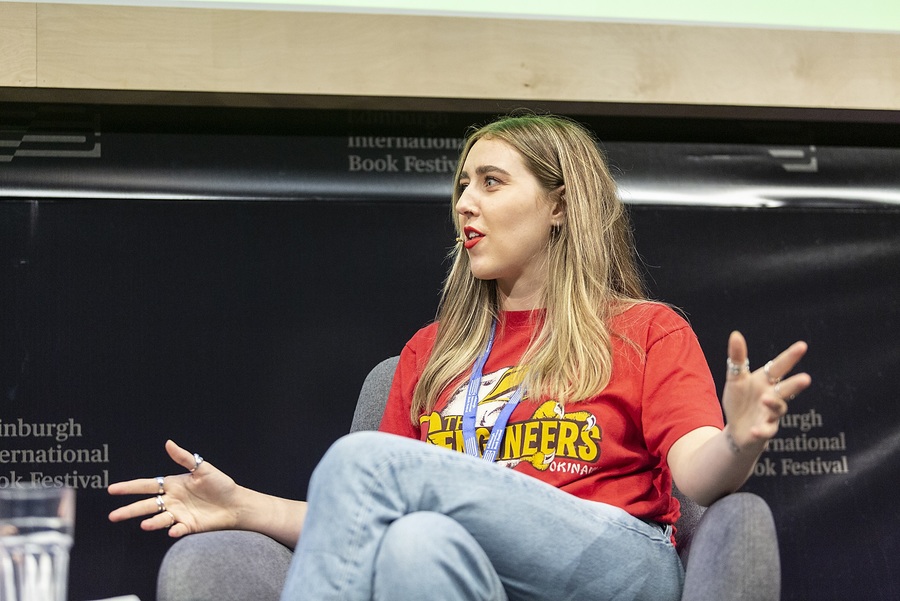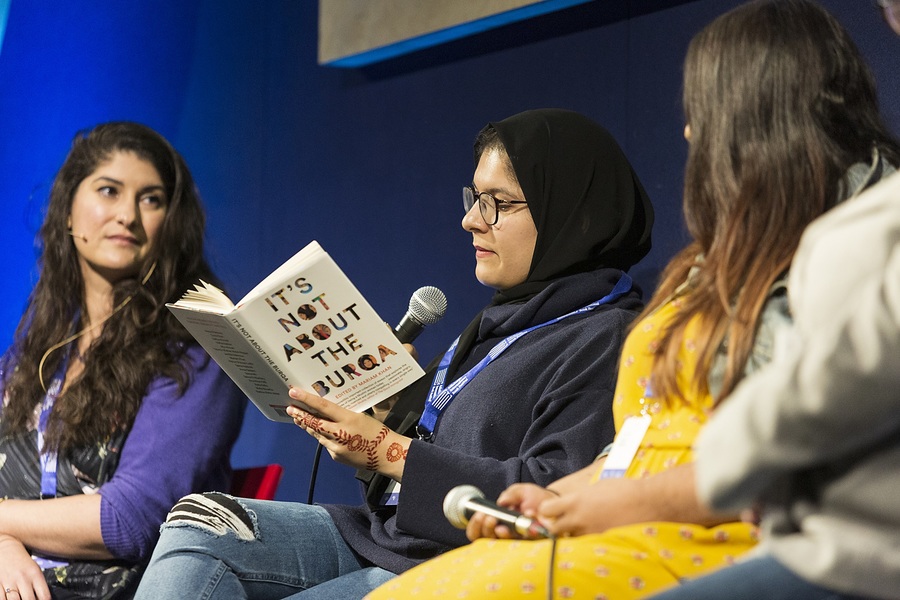Edinburgh Book Festival: The World Around Us
With authors from across the world descending on Charlotte Square Gardens, The Skinny rounds up some of the best non-fiction events from the first full week of the Edinburgh International Book Festival
Eunice Olumide: Walking the (Cat)walk
Supermodelling, films, TV, podcasts, Question Time appearances, MBE recipient – Eunice Olumide has done it all. And now she can add author to her endless list of accolades. How to Get into Fashion began as a blog answering key questions she answered repeatedly via email; it became a fantastic guide for those navigating the industry.
Eunice was a tomboy and hadn’t wanted to be a model; she discusses the racism she faced, before and after being scouted, the impact that had on her self-esteem, and how that filters through the industry. From the start, she had boundarie. Instead of being seen as assertive, she was dubbed ‘difficult’; she chose education in what could be dubbed her ‘peak’ years for fashion; she fights for causes, she questions the ethics of the industry she’s in. Now in a better place with her work, she wants to share her own experiences for others.
It’s not only an inspiring event in which she spotlights that truly being yourself attracts people with the same ethos, but a rallying cry to climate awareness through fashion, which is currently the second-biggest polluter on the planet. For those interested in the industry, Eunice offers a guiding hand; for everyone, she offers a rallying cry to do better and be more aware of how fashion impacts the planet. It’s a brilliant, funny and thought-provoking hour. [Heather McDaid]
What is “Gender” in the 21st Century?: Personal choice, political change
Opening the Edinburgh International Book Festival’s New York Times Debate Series is an event asking what “gender” means in the 21st century. Tasked to answer a question this large and vague, the panellists – Naomi Wolf, Amelia Abraham and Palko Karasz – handle it admirably as they move through how they personally define gender, how our ideas of gender have changed over time, the impact the internet has had on gender and censorship in relation to free speech.
While the panellists keep the discussion moving swiftly on, the lack of people of colour, trans and non-binary panelists is a disconcerting decision for an event that aims to ask and answer what gender means this side of 1999. The lack of an intersectional discussion quickly dries up the conversation and the oversight is hard to get past. What does “gender” mean in the 21st century? I highly doubt it’s this. [Katie Goh]
Mary Portas: Work Like A Woman
Mary Portas is calling time on macho culture in the workplace in Work Like A Woman. The realisation came when her son was heading into the workplace and she began prepping him to change for the culture; it was toxic, and she realised that attitude was wrong. “In order for me to succeed I’d taken on these codes of work,” she says, acknowledging she’d been successful by giving in to that culture.
Portas decided to change her whole business, diving into philosophy and what mattered most to her. The deep joy wasn’t there in her soul, so she brought a focus of kindness and respect, values typically associated with women, she says. She wanted to show the power of the feminine and showcase those values under the title of woman. This method is the antithesis of The Apprentice – how kindness can work in a capitalist society. The times you’ve been happiest are when you’ve truly been you, and success now only considers economic growth, not how people are cared for, which needs to change.
It’s an inspiring prospect, though explored at a surface level that at times felt lacking. Simply put: “Get out. Speak. Say, ‘No more.’” [HM]
Gina Martin: Exposing Injustice
In England and Wales, upskirting wasn’t an offence until activist Gina Martin took up the cause. She tells of going to a Killers concert and finding a man taking a photo up her skirt – who ultimately suffered no consequences – and the resulting trauma and lack of accountability she faced.
“There are so many rules for victims,” Gina explains; after all that, the support systems in place weren’t equipped to really help. So she set about changing that. With no legal or political background, she started on social media, changing the law within 18 months. Now she wants to help others rally for the change they want to see.
“This is what I wanted,” she says of her book (an activism handbook of sorts), and the notion of creating the thing you yourself needed. Use your voice, find you’re not alone in your experience. What was previously isolating can bring a community who understand and can buoy you up. She acknowledges her privilege of choosing to be an activist; some people have no choice but to fight for a cause. Activism isn’t easy, and despite her rapid success, she is honest about the good and bad. An emotive hour, and one sure to lay the groundwork for others wanting to make a difference, but unsure where to start. [HM]
Nadine Aisha Jassat, Mariam Khan & Amna Saleem: In the Words of Muslim Women
Published to wide acclaim earlier this year, the excellent essay collection It’s Not About the Burqa seeks to redirect the narratives around Muslim women in the UK. Essayists Nadine Aisha Jassat and Amna Saleem, as well as the collection’s editor Mariam Khan, introduce their respective essays before launching into a wide-ranging discussion on the power of narratives – Muslim women dealing with abuse from all sides and the need for coversations within communities.
Despite Jassat and Saleem having only met for the first time that afternoon, the conversation is jovial (“look at me, friends with a poet,” laughs Saleem gesturing at Jassat), as much as it is powerful and hard hitting. There is a sense of trust and community between the women, made apparent when Khan refuses to ask her contributors to answer an inappropriate audience question which threatens to derail the conversation. It’s an event that encapsulates the spirit of the essay collection. [KG]
Read more on It's Not About the Burqa in The Skinny's interview with Mariam and Amna.


